Saudi Arabia is likely to have used cluster bombs that have been made by the US - and which are banned across most of the world - against Houthi rebels in Yemen.
The campaign group Human Rights Watch (HRW) said it had “credible evidence” the weapons had been used.
A treaty signed by 116 countries, but not the US, Saudi Arabia or Yemen, prohibited the use of cluster munitions in 2008.
Steve Goose, arms director at HRW, said: “Saudi-led cluster munition airstrikes have been hitting areas near villages, putting local people in danger.
“These weapons should never be used under any circumstances,” he added.
It comes as Saudi Arabia is ensnared in a conflict in Yemen, as part of a coalition of Sunni states against the Iran-backed Houthi rebels in the country.
After the airstrikes against the rebels began in March, Saudi Arabia denied using the weapons. Brigadier General Ahmed Asseri told media: “We are not using cluster bombs at all.”
The coalition is seeking to restore President Abd-Rabbu Mansour Hadi’s government to power and is supported logistically by the US, UK and France.
To date, the coalition has primarily conducted airstrikes in Yemen, but has not ruled out the possibility of sending in conventional troops in the future.
More than 1,000 people, including about 551 civilians, have been killed in Yemen during the fighting since the bombings began in March, according to the UN.
Cluster munitions are designed to spread over a large area, typically the size of a football pitch, before they explode – putting anyone in the immediate vicinity at risk of injury or death.
Additional reporting by Reuters
Subscribe to Independent Premium to bookmark this article
Want to bookmark your favourite articles and stories to read or reference later? Start your Independent Premium subscription today.


Join our commenting forum
Join thought-provoking conversations, follow other Independent readers and see their replies